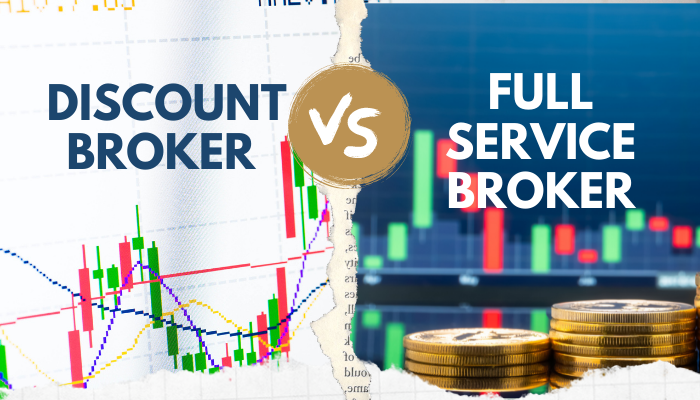Do you want to know about the differences between discount brokers and full-service brokers? Do you want to know which one would suit your investing and trading needs? Or any other financial needs that you might have?
In this post, you will learn about different types of brokerage firms in India. In addition to the discount and full-service brokerages, I have also described the services offered by scheduled commercial banks and how they offer stock broking services.
3 Different Types of Brokerage Firms
The trading in shares, share indices, derivatives (future & options), currency, commodities, and other financial instruments happens on stock or commodity exchanges in India. In order to trade you need a broker who acts as an intermediary between you and the Exchange. These brokers are registered with the Securities & Exchange Board of India (SEBI).
Essentially there are 2 types of brokerages but I have categorized scheduled commercial banks as the third type. The banks are necessarily full-service agents but they provide a wider range of services.
Full-Service Brokers Or Traditional Brokers
As the name suggests, these brokers provide a full range of services related to different types of securities. They not only provide stock broking services but also all kinds of research, advisory, trading, and, investment services related to stocks, derivatives, commodities, bonds, debt instruments, mutual funds, insurance, IPOs, and other exchange-traded securities.
On the flip side, the broking charges and commissions are generally higher than discount brokers.
Discount Brokers Or Budget Brokers
Discount brokers just provide the sock and derivatives trading services. They do not offer research or advisory services. Many of them also offer trading facilities for commodities and currency.
Generally, their broking charges and commissions are on the lower side.
Scheduled Commercial Bank
Do you remember that time when your bank representative calls you and pesters you for investing in confusing financial products and claims that these can solve all your worldly problems? Well, you and I know that he is just a salesman and wants to push something down your throat. In today’s world, banks have become the one-stop shop for all kinds of financial products, including share trading products.
Most of the scheduled commercial banks provide a full range of broking services. They either have a tie-up with a full-service broker or they have their own subsidiary firm that is a registered SEBI broker. They offer huge convenience to the customer. You can open and maintain all three accounts (savings, trading, and Demat) at the same bank. These are called 3-in-1 accounts.
13 Differences Between Discount Broker And a Full-Service Broker
Brokerage Calculation Example
Let us assume that you are a light trader and you do 1 buy/sell transaction in a week that is worth Rs. 10,000/-. Let’s assume that you would do 50 transactions in a year. Let us see how much brokerage you would pay in different scenarios.
Note: Brokerage is paid separately for buy and sells transactions.
What is the minimum amount you should invest?
Scenario I – Discount Broker
Considering Rs. 20/- as brokerage per transaction, you would need to pay Rs. 2,000/- (20*2*50) in a year. Some brokers charge even less. You can pay as little as Rs. 10/- per transaction which would further reduce your yearly brokerage cost to Rs. 1,000/-.
Scenario II – Full-Service Broker
Considering 0.3% as brokerage per transaction, you would need to pay approximately Rs. 3,000/- (0.3%*10000*2*50) in a year. This is a bit higher than the scenario I but not too high.
Scenario III – Scheduled Commercial Bank
Considering 0.5% as brokerage per transaction, you would need to pay approximately Rs. 5,000/- (0.5%*10000*2*50) in a year. This is substantially higher than the scenario I.
Let’s see what happens when you become an expert trader and start doing trades of Rs. 1,00,000/- per transaction then,
Scenario I – Brokerage remains the same as before.
Scenario II – Brokerage becomes Rs. 30,000/- (0.3%*100000*2*50) in a year
Scenario III – Brokerage becomes Rs. 50,000/- (0.5%*100000*2*50) in a year
Conclusion
If you are a beginner you should not lose sleep over which broker is better for you. You would have noticed that there is a huge competition amongst the brokers. There are hundreds of them. You can go with any popular broker as completion will always keep the costs low and service levels high. In a rare case, if you are dissatisfied with your chosen broker then you can always change it.
You should only decide on the type of broker you want to trade with.
If you are looking for convenience, hand-holding, and a full range of services, you should opt for a scheduled commercial bank as your service provider. On the other hand, if you are looking for a full range of services full service with slightly lesser fees then a full-service broker would suit your needs. Lastly, if you think you can manage on your own and want to trade heavily then you should go for a discount broker.
Over To You
Were you able to decide on the right broker for you after reading this post? Which type broker best fits your needs? What other information would help you? Please leave a comment.
Have a profitable life ahead!




